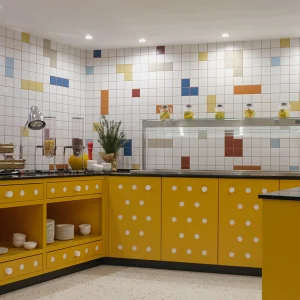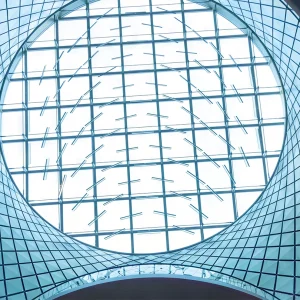
Design: Prism Design
For those who like a bit of a filmic influence while they are dining, look no further than the Kemuri Shanghai Restaurant, which opened at the end of last year. Located in the Yan’an Xi Lu part of the city, at the Garden Centre, it is the first Chinese incarnation following more than a decade of success in Japan for Edo Robata Kimuri restaurants.
The 200 sq m interior, the work of Prism Design, strongly references the Kill Bill films, as a nod to how the West views Eastern culture. But don’t fear, not a jot of blood was shed in the making of this restaurant… The red used for the glass facade and windows is not just the national colour of both China and Japan, but is symbolic of the goriness of the Quentin Tarantino classic.
Bare concrete gives a contemporary feel to the walls, with one featuring a red vein as if Kill Bill star Uma Thurman had just left the building. And a steel panel at one of the restaurant looks like it has been severely beaten….
The relationship between people was also central to the brief, which is why one of the main materials used was hemp, 1,500m in total on features such as the rope curtaining. ‘I have expressed Japanese architecture in the silhouette of this rope,’ says Tomohiro Katsuki, one of the designers working on the project. ‘The silhouette changes with different lighting effects.’ As well as being incredibly strong, hemp is intended to symbolise a spirit of collaboration and cooperation between the diners.
Other materials that were key to the aesthetic are wood, used for the floor, bamboo and ceramic, for the walls. For the latter, site-specific ceramic artwork by Atsuki Tanaka was commissioned. Noh masks, used in classical Japanese musical drama, guide guests to the toilets.
Another inspiration comes from this eatery’s name : Kemuri means smoke in Japanese and is the name of a style of Far Eastern cookery, while the theme, says Katsuki, is the ‘shrines and temples of Japanese architecture’. Certainly the rope curtains, the mood lighting and the low-level tables give this interior a contemplative feel.
Prism Design, which is based in Shanghai, has worked on other hospitality projects such as the Tao restaurant in the Howard Johnson Garden Plaza in Yixing, and Jane’s bar and the Fount Japanese restaurant, both in Shanghai.





